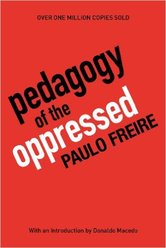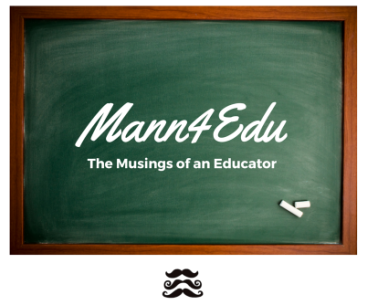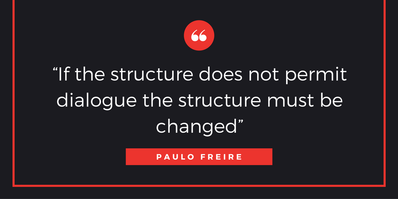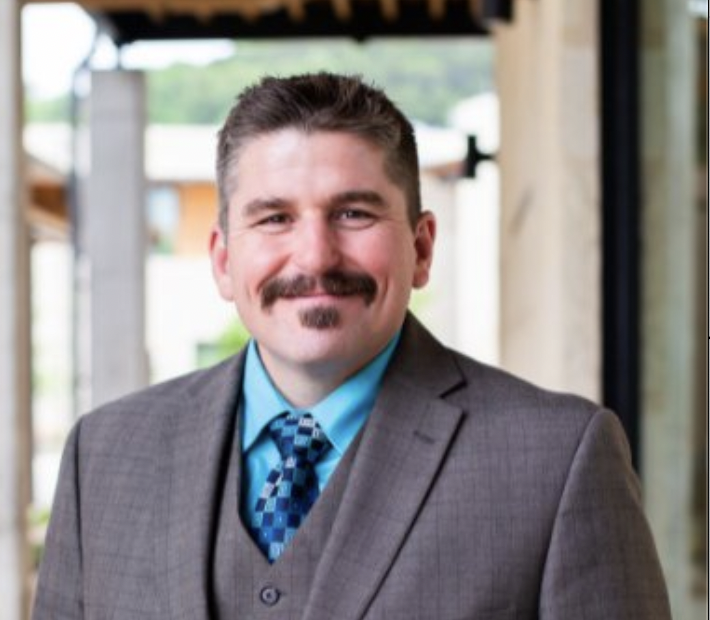|
We recently read Pedagogy of the Oppressed by Paulo Freire as a part of our doctoral program. This book was utilized by the professor to help us to better understand the role of social justice in schools. I must admit that when I first read the title I was skeptical about what I was going to learn from the book. I had not really thought of schools being a place that oppressed students. I mean, we are trying to teach students and give them knowledge to help their future. How are we oppressing them? After reading the book he wrote in 1968, I have changed my thinking. It is still relevant in 2016. I am not going to recap the book here for you, but I do encourage you to read it for yourself. You just may be surprised at what you read. I am going to share with you one aspect of Freire’s argument that is still relevant in schools almost 50 years later. Freire calls it “Banking Education” and today we would call it “Sit and Get Lecture”. The basic premise about banking education is that the teacher is the keeper of all of the knowledge, ready to deposit this knowledge into the receptacle that is known as the student. Sound familiar?  Freire viewed this teaching approach as oppressive to students because it does not allow students to seek out their own knowledge, participate in meaningful dialogue with the teacher or their peers, research their own learning with the help of their teacher or solve their own problems. In the banking model the teacher is in full control of the learning and students are merely supposed to absorb the information that is presented and regurgitate that information back to the teacher upon request. This process is supposed to demonstrate students’ ownership of the knowledge that has been deposited within them by the teacher. Do you feel that this is true? Do you know of anyone that teaches this way? How is the learning engagement in their classroom? What skills are these students developing that will help them outside of the classroom? These are the questions that I ask when I see sit and get lecture used as the primary means of instruction. I am not saying that lecture does not have a place in education but I am saying that it cannot be the go to method of instruction. This passive learning environment does not promote the profound learning that we all want and need for our students. Instead, it creates students that can sit, listen, try to stay focused for long periods of time, take notes, and then repeat the information back to the teacher during an exam. I am also not saying that every teacher teaches this way but I am going to say that lecture is still a primary method of delivery for most teachers today. Why? Because it is easy and safe. There is much less upfront work needed to prepare for a lecture when compared to a station rotation session, or a PBL unit, or a flipped unit. It is safe because the teacher is in the driver’s seat the entire time and does not have to turn over control of the learning to the students. Turning over control is a scary thing. I get that. I also get that students cannot ever fully learn if they do not have control over their own learning. As a principal I would argue the same for my teachers and their own learning.
Is the passive learning environment the best for student learning? No. It is best for student compliance but not for learning. Why? Because the students are not doing anything with the knowledge and information. Students need to manipulate the knowledge, explore as a part of their learning, have conversations about what they have learned, collaborate with their peers, and apply their learning in multiple settings and activities. Students need time to develop ownership over their learning. They cannot do this sitting quietly at their desk day after day. Teachers need to facilitate learning and create learning environments that allow for active student learning. We need more facilitators of learning and not educational bankers. Which are you? What is holding you back? Think. Achieve. Succeed. Jeff
0 Comments
Leave a Reply. |
Jeff MannA lifelong learner that is committed to asking questions to seek greater understandings. Do what you can, with what you have, where you are Archives
January 2023
Images & Quotes that Inspire |




 RSS Feed
RSS Feed
